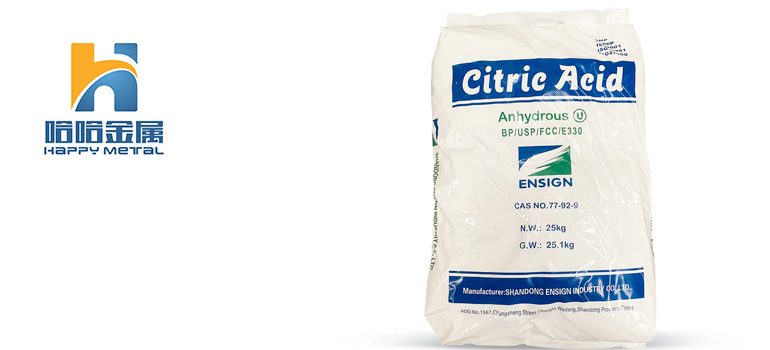Summary:
The Benefits of Citric Acid in Cosmetics: Why It’s a Must-Have Ingredient
What is Citric Acid and How It Works in Cosmetics?
The Key Benefits of Citric Acid in Cosmetics
Citric Acid in Cosmetics: Uses in Different Products
How to Choose the Right Cosmetic Products Containing Citric Acid?
What is Citric Acid and How It Works in Cosmetics?
Citric Acid is a naturally occurring compound found in citrus fruits like lemons, oranges, and grapefruits. It is one of the most commonly used ingredients in the cosmetic industry due to its versatile properties. In cosmetics, citric acid serves various functions, from balancing the pH of products to providing gentle exfoliation and improving the skin’s overall texture and appearance. But how exactly does citric acid work in cosmetic formulations? Let’s break it down.
One of the most well-known benefits of citric acid in cosmetics is its ability to gently exfoliate the skin. Exfoliation is an essential step in skincare as it removes dead skin cells, revealing fresher and more vibrant skin underneath. Citric acid, being an alpha hydroxy acid (AHA), helps break down the bonds that hold dead skin cells together. This makes it easier to remove them, resulting in smoother, more even-toned skin.
Because citric acid is a mild exfoliant, it is suitable for most skin types, including sensitive skin, making it a popular ingredient in gentle exfoliating lotions, cleansers, and masks. Unlike more abrasive physical exfoliants, citric acid provides a chemical exfoliation that is less likely to cause irritation, making it an excellent choice for anyone looking for a soft yet effective solution for smoother skin.
The Role of Citric Acid in pH Balancing Cosmetics
Another key function of citric acid in cosmetics is its role in balancing the pH levels of various products. The skin’s natural pH is slightly acidic, typically around 4.5 to 5.5, and maintaining this balance is crucial for keeping the skin healthy and resilient. However, many skincare products, especially cleansers and toners, can disrupt the skin’s pH balance, making it either too alkaline or too acidic.
Citric acid helps to adjust and stabilize the pH of cosmetic products, ensuring they are compatible with the skin’s natural acidity. When used in formulations like shampoos, facial cleansers, and lotions, citric acid prevents the skin from becoming too dry or irritated by harsh, alkaline ingredients. This pH-balancing property is why citric acid is often included in a variety of personal care products designed for daily use, offering a gentle, skin-friendly experience.
The Key Benefits of Citric Acid in Cosmetics
Citric acid is more than just a natural preservative—it’s a powerhouse ingredient in the cosmetic world. This humble compound, derived from citrus fruits, offers numerous benefits that make it an essential addition to many cosmetic formulations. From exfoliation to brightening, citric acid has a broad range of uses that can enhance the health and appearance of your skin. Here are some of the key benefits of citric acid in cosmetics:
Promoting Skin Exfoliation and Renewal
One of the most significant benefits of citric acid in cosmetics is its ability to exfoliate the skin. As an alpha-hydroxy acid (AHA), citric acid works by breaking down the bonds between dead skin cells on the surface, making it easier to remove them. This process reveals fresher, younger-looking skin underneath, helping to:
- Reduce the appearance of fine lines and wrinkles: By removing the outer layer of dead skin cells, citric acid encourages cell turnover, which can help minimize the visible signs of aging.
- Promote even skin tone: Exfoliation helps fade dark spots, hyperpigmentation, and acne scars, leading to a more uniform complexion.
- Improve skin texture: The gentle exfoliation provided by citric acid softens rough patches and promotes smoother skin.
What sets citric acid apart from other exfoliants is that it provides chemical exfoliation without causing irritation, making it a suitable choice for most skin types, including sensitive skin.
Brightening and Even Toning of the Skin
Citric acid is renowned for its ability to brighten the complexion and enhance skin radiance. By encouraging the shedding of dead skin cells, citric acid allows newer, more vibrant skin to surface. This process also helps reduce the appearance of:
- Dullness: Regular use of citric acid can restore a healthy, glowing complexion by removing the layers of dead skin that can make skin look tired or lifeless.
- Uneven skin tone: Citric acid helps fade dark spots, age spots, and other forms of pigmentation, leading to a more even skin tone.
In addition to its exfoliating and brightening properties, citric acid has been shown to help boost the effectiveness of other brightening agents, such as vitamin C, by creating an optimal acidic environment in which these ingredients can thrive.
Acting as an Antioxidant for Healthier Skin
Another important benefit of citric acid in cosmetics is its antioxidant properties. As an antioxidant, citric acid helps protect the skin from the damaging effects of free radicals—unstable molecules that are caused by factors like sun exposure, pollution, and stress. Free radicals can accelerate the aging process and contribute to skin damage. By neutralizing these harmful molecules, citric acid helps to:
- Prevent premature aging: By combating oxidative stress, citric acid helps maintain youthful skin by slowing down the formation of fine lines, wrinkles, and age spots.
- Enhance skin resilience: Regular use of citric acid can improve the skin’s natural ability to protect itself against environmental stressors.
The antioxidant properties of citric acid make it an essential ingredient in skincare products designed to prevent signs of aging and maintain a healthy, radiant complexion.
Citric Acid in Cosmetics: Uses in Different Products
Citric acid is a multi-functional ingredient that has found its way into a wide variety of cosmetic products. Whether in skincare, haircare, or body care formulations, citric acid enhances the effectiveness of products, improves their texture, and contributes to their overall performance. Below, we explore how citric acid is used in different types of cosmetic products and its specific benefits in each category.
Citric Acid in Facial Care Products
In facial care, citric acid is commonly used to improve skin texture, brighten the complexion, and maintain the skin’s natural pH balance. Some of the most common facial care products containing citric acid include:
Cleansers: Citric acid helps balance the pH of facial cleansers, ensuring that they are gentle on the skin while effectively removing impurities. By helping maintain a slightly acidic environment, it prevents the skin from becoming too dry or irritated.
Toners: Citric acid in toners helps to refine pores and enhance the skin’s texture. It also aids in balancing the skin’s natural pH, which is crucial for maintaining hydration and preventing excess oil production. Additionally, it can provide a gentle exfoliation that makes the skin look brighter and more radiant.
Exfoliating Masks and Scrubs: Citric acid is a key ingredient in chemical exfoliants. It helps remove dead skin cells, revealing smoother and fresher skin. Unlike abrasive physical scrubs, citric acid provides a gentle yet effective chemical exfoliation, making it suitable for sensitive skin.
Serums: Citric acid in serums helps brighten skin tone, reduce the appearance of dark spots, and promote overall skin radiance. It also supports the delivery of other active ingredients, like vitamin C, by providing an optimal acidic environment for their absorption.
The Role of Citric Acid in Hair Care Formulations
Citric acid is also a valuable ingredient in hair care products, where it helps improve the texture and appearance of the hair and scalp. Here are some ways citric acid is used in hair care:
Shampoos: Citric acid helps adjust the pH of shampoos, making them less alkaline and more compatible with the scalp’s natural acidity. This can prevent the scalp from becoming dry or irritated. It also helps remove mineral buildup from hair products and hard water, ensuring your hair stays clean and healthy.
Conditioners: Citric acid is commonly found in conditioners because it helps smooth the hair cuticle, making the hair appear shinier and more manageable. By balancing the pH, citric acid also helps seal moisture into the hair shaft, preventing dryness and frizz.
Hair Masks: Citric acid in deep conditioning treatments helps enhance the absorption of nutrients into the hair, allowing for more effective moisturization and nourishment. It can also help detangle hair and restore the natural pH balance of the scalp, which is vital for healthy hair growth.
Citric Acid in Body Lotions and Creams
In body care, citric acid is used in lotions, creams, and body washes to improve skin hydration, exfoliate, and balance the product’s pH. Here’s how citric acid contributes to body care formulations:
Body Lotions and Creams: Citric acid helps adjust the pH of body lotions and creams to match that of the skin, which is essential for maintaining healthy moisture levels and preventing irritation. By enhancing product penetration, citric acid ensures that moisturizing ingredients work more effectively.
Body Washes: Citric acid in body washes helps cleanse the skin while ensuring that the skin’s natural barrier remains intact. It helps prevent the skin from becoming overly dry after cleansing and aids in removing impurities and dead skin cells, leaving the skin smooth and soft.
Exfoliating Scrubs: Like its use in facial exfoliants, citric acid is often included in body exfoliating products. By providing a mild chemical exfoliation, citric acid helps remove dead skin cells and promote the renewal of healthier skin. This is especially helpful for areas like elbows, knees, and feet, which can have rougher skin.
Citric Acid in Sunscreen Formulations
Citric acid plays an important role in sunscreen formulations as well, providing both functional and aesthetic benefits:
Stabilizing Active Ingredients: Citric acid helps stabilize sunscreen agents like zinc oxide and titanium dioxide, ensuring that the sunscreen remains effective and doesn’t degrade when exposed to sunlight or air. By maintaining the integrity of these UV filters, citric acid enhances the sunscreen’s protective properties.
Improving Product Texture: Citric acid can help improve the texture of sunscreens, making them easier to apply and more comfortable on the skin. It prevents sunscreens from feeling greasy, which increases user compliance and encourages regular application.
Citric Acid in Cosmetics is a versatile ingredient that can be found in many different types of personal care products. Whether you’re using a facial cleanser, a hair conditioner, a body lotion, or even sunscreen, citric acid provides numerous benefits, from exfoliation and pH balancing to improving the stability of other ingredients. Its presence in a wide range of products shows just how effective and multifunctional this ingredient is in promoting healthier, more radiant skin and hair. By understanding how citric acid works in these products, consumers can make more informed choices when selecting personal care items that best suit their needs.
How to Choose the Right Cosmetic Products Containing Citric Acid
Citric acid is a versatile ingredient used in a wide range of cosmetic products due to its exfoliating, pH-balancing, and brightening properties. However, with so many products on the market, it can be overwhelming to know which ones are right for your skin. Choosing the right cosmetic products containing citric acid requires understanding your skin type, the product’s formulation, and how citric acid is used within that product. Here’s a guide to help you make an informed choice.
Identify Your Skin Type and Concerns
The first step in choosing the right cosmetic products with citric acid is understanding your skin type and specific concerns. Different skin types respond to citric acid in different ways, so selecting products formulated for your skin needs is crucial.
- Sensitive Skin: If you have sensitive skin, opt for products with a lower concentration of citric acid (under 5%) to avoid irritation. Look for formulations that include soothing ingredients like aloe vera, chamomile, or calendula to minimize the risk of redness or stinging.
- Oily or Acne-Prone Skin: Citric acid can help oily or acne-prone skin by gently exfoliating and unclogging pores. Look for products like exfoliating cleansers or toners that contain citric acid to address excess oil and prevent breakouts.
- Dry Skin: For dry skin, choose products that combine citric acid with moisturizing ingredients like hyaluronic acid, glycerin, or ceramides. These ingredients help restore moisture while citric acid exfoliates, preventing your skin from feeling too tight or dry.
- Normal or Combination Skin: Normal and combination skin types are generally more adaptable to citric acid. Products like toners, exfoliating masks, and moisturizers containing citric acid will help maintain your skin’s balance and promote a healthy complexion.
Consider the Concentration of Citric Acid
The effectiveness of citric acid in a product depends on its concentration. While citric acid is beneficial in lower concentrations, higher concentrations may be more effective for specific concerns but could cause irritation if used improperly. Here’s how to determine the right concentration for your skin:
- Low Concentrations (1-5%): Products with lower concentrations of citric acid are ideal for daily use, gentle exfoliation, and maintaining pH balance. These are perfect for people with sensitive skin or those looking for subtle, long-term results. Toners, cleansers, and moisturizers often contain citric acid in these concentrations.
- Moderate Concentrations (5-10%): If you’re looking for more noticeable exfoliation or to address issues like uneven skin tone or dullness, products with a moderate concentration of citric acid can provide the right balance. These concentrations are commonly found in exfoliating masks or serums designed to brighten the skin or promote smoother texture.
- High Concentrations (10% and above): Products with high concentrations of citric acid are often used for professional treatments or occasional deep exfoliation. These are more intense and can lead to visible results, such as reducing fine lines or pigmentation. However, they are best used with caution, especially for sensitive skin, and may require guidance from a dermatologist.
Choose the Right Type of Product for Your Needs
Citric acid is used in a variety of cosmetic products, each designed to address specific skincare concerns. Depending on your skin’s needs, you should choose the product type that aligns with your goals.
- Cleansers: If you want a gentle daily exfoliant, look for facial cleansers containing citric acid. These products help remove dead skin cells while balancing the skin’s pH, preventing over-drying and leaving your skin feeling fresh and smooth.
- Toners: Toners containing citric acid are great for refining pores and promoting a balanced complexion. They help remove any remaining impurities after cleansing and prepare the skin to absorb the following skincare products.
- Exfoliating Masks or Scrubs: If you need a more intensive exfoliation, choose an exfoliating mask or scrub that contains citric acid. These products are ideal for addressing concerns like dullness, rough texture, or clogged pores. They provide a deeper level of exfoliation, revealing brighter and smoother skin.
- Serums: For targeted treatments, serums with citric acid can provide concentrated benefits. Look for serums that also contain other brightening or anti-aging ingredients, such as vitamin C or niacinamide, for a comprehensive skincare routine.
- Moisturizers: If your skin is dry or needs both exfoliation and hydration, choose moisturizers that combine citric acid with hydrating ingredients. These products will help exfoliate the skin while preventing moisture loss, ensuring your skin stays soft and nourished.
Look for Complementary Ingredients
While citric acid is effective on its own, it often works best when combined with other complementary ingredients. Depending on your skin needs, look for products that include additional beneficial components to enhance the effects of citric acid:
- Hydrating Ingredients: If you have dry or sensitive skin, look for products that pair citric acid with hydrating ingredients like glycerin, hyaluronic acid, or aloe vera. These ingredients help counteract the potential drying effects of citric acid, keeping your skin moisturized and plump.
- Soothing Agents: Ingredients like chamomile, green tea extract, and calendula are great for sensitive skin. They help reduce the likelihood of irritation and redness that can occur from exfoliating with citric acid.
- Brightening Agents: If your goal is to even out skin tone and reduce pigmentation, combine citric acid with brightening ingredients like vitamin C, niacinamide, or licorice extract. These ingredients work synergistically with citric acid to enhance its ability to brighten the skin and reduce dark spots.
- Anti-Aging Ingredients: Citric acid can be paired with ingredients like retinol, peptides, or collagen to promote smoother, more youthful-looking skin. These ingredients support collagen production and help reduce fine lines and wrinkles over time.




